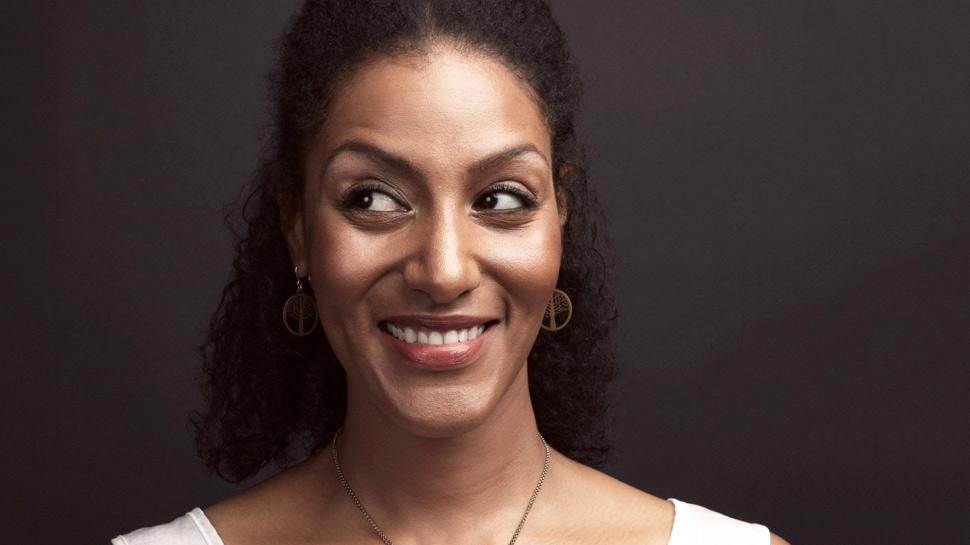Sarah Jones is a Tony Award winning playwright and performer. Her multi-character solo show Bridge & Tunnel was originally produced Off-Broadway by Oscar-winner Meryl Streep, and went on to become a critically acclaimed, long running hit on Broadway. Educated at Bryn Mawr College and the United Nations International School, Sarah recently returned to her UN School roots by becoming a UNICEF Goodwill Ambassador, traveling as a spokesperson on violence against children, and performing for audiences from Indonesia to Ethiopia, the Middle East and Japan. Winner of the 2007 Brendan Gill Prize, Sarah has also received grants and commissions from The Ford Foundation, NYSCA, the W. K. Kellogg Foundation, and others, and theater honors including an Obie Award, a Helen Hayes Award, two Drama Desk nominations, and HBO’s US Comedy Arts Festival’s Best One Person Show Award, as well as an NYCLU Calloway Award in recognition of Sarah as the first artist in history to sue the Federal Communications Commission for censorship. The lawsuit resulted in reversal of the censorship ruling, which had targeted her hip-hop poem recording, “Your Revolution.”
Q: What’s the most significant risk you’ve taken professionally?
Sarah: I always thought the most significant professional risk I'd ever taken was dropping out of Bryn Mawr College as an aspiring lawyer to instead place my destiny in the hands (and voices) of an unruly bunch of fictional characters who lived in my head. But over the years my 'people' have had more of a steadying influence on my life, both on and off stage, than I'd ever expected--or have ever given them credit for. So I thought I'd ask a few of them what they think my most significant professional risk has been so far.
Rashid, an African American ("Why can't I just be black, son?") hip-hop head, sometime rapper, and full time Brooklynite still recovering from the gentrification of Bed Stuy, had this to say: "Sarah Jones' biggest risk? I'ma have to say turning down a couple of different TV shows cuz of her principles and whatnot. I'm like, yeah, you gotta have your morals and all that, but if them dudes in Hollywood ain't worried about it, why you gotta be all Holy Dalai Lama and whatnot--just get that check, you feel me? If you still feel bad at the end, at least you got some loot, you could pay for a therapist!"
Lorraine Levine, an octogenarian Jewish bubbie with Eastern European roots who has been in nearly every performance I've given, shared the following: "You want risky? I always say Sarah is a very nice young Black performer, but I remember one time she was pale as a ghost--the poor thing, such agita she had--because she agreed to perform in Israel at an Arab theater as part of a multicultural event, trying to be all things to all people, and instead she ended up stuck in the middle. I had told her, with some situations, no matter how much your heart is in the right place, you can't win. But did she listen?"
Nereida, an ambitious young DominiRican (half Dominican, half Puerto Rican, all proud) who grew up in what she calls "the capitol of the Dominican Republic, otherwise known as Washington Heights" opined: "Sarah Jones' riskiest decision has to be when she sued the FCC for censoring her feminist poem/song from radio airplay. I mean, I agree the FCC was clueless, but suing the US government? And on top of that, her lawyers eventually won the battle by forcing them to reverse their decision--I think she really got on their bad side. I mean, not that they would ever retaliate. I'm sure the IRS audit a few years later was a total coincidencia!
Ms. Lady, an older black woman and self-described PhD (Poor, homeless, and disabled) wanted the last word: "I think the riskiest thing Sarah Jones ever did is what she doing right now--trying to write a commission for the Lincoln Center Theater, and they ain't gave her no deadline, no subject she gotta stick to, no rules at all. Not like most recent things she been writing. So she got to go someplace she scared to be at--the place where she started from--total freedom, to try, to risk failing, to tell the whole truth like she see it, to let go of fancy expectations if she brave enough. Ain't nothing and nobody in her way. So naturally, all this freedom got her acting more like she got a prison sentence than a commission. But I tell her everyday, keep on feeling that scared feeling, and when it gets to be too much, lean on into it a little bit more. Then wake up the next day and do it again. The risk gon' be worth it.
